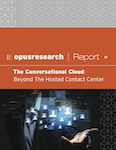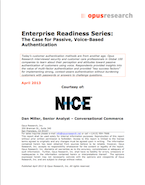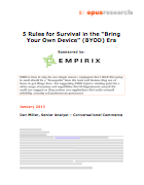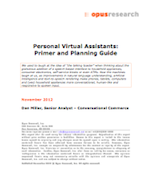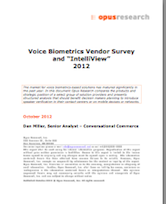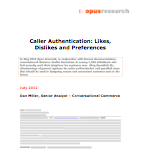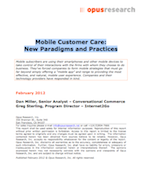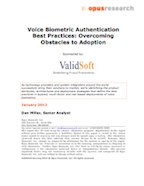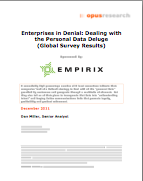Customer care and self-service strategies now leverage Big Data, Predictive Analytics, Machine Learning and Natural Language Processing to foster simple, speedy task completion and customer empowerment.
Reports
Enterprise Readiness Series: The Case for Passive, Voice-Based Authentication
Featured Research Today’s customer authentication methods are from another age. Opus Research interviewed security and customer care professionals in Global 100 companies to learn about their perception and attitudes toward passive authentication of customers using voice. Respondents provided insights into… Read More ›
Research Report: 5 Rules for Survival in the “Bring Your Own Device” (BYOD) Era
Supporting BYOD is just a starting point for a whole range of services and capabilities that IT departments around the world can support as they nurture new applications that make network reliability, security and performance paramount.
Research Report: Personal Virtual Assistants: Primer and Planning Guide
We used to laugh at the idea of “the talking toaster” when thinking about the gratuitous addition of a speech-based interface to household appliances, consumer electronics, self-service kiosks or even ATMs. Now the machines laugh at us, as improvements in natural language understanding, artificial intelligence and text-to-speech rendering make phones, tablets, computers and (yes) household appliances more conversational, human-like and responsive to spoken input.
Research Report: Voice Biometrics Vendor Survey and “IntelliView” 2012
The market for voice biometrics-based solutions has matured significantly in the past year. In this document Opus Research compares the products and strategic position of a select group of solution providers and presents structured analysis that should benefit decision makers planning to introduce speaker verification in their contact centers or on mobile devices or networks.
Survey Results – Caller Authentication: Likes, Dislikes and Preferences
In May 2012 Opus Research, in conjunction with Nuance Communications, commissioned Coleman-Parkes Associates to survey 1,000 individuals who had recently used their telephone for customer care. They described the shortcomings of present systems for caller authentication and provided clues that should be used in designing secure and convenient customer care in the future.
Conversational Commerce Paper: IVRs Take On New Tasks
People will go to great lengths to avoid interactive voice response (IVR) systems. Yet progressive, customer-pleasing companies like Hyatt Hotels are putting conversational IVR systems into place to the benefit of both their guests and their contact center agents. Therefore, in an age when some have said “The IVR is Dead,” we see “Conversational IVR” playing the role of Virtual Assistant in the enterprise, fostering a better customer experience and higher morale among customer service representatives.
Research Report-Mobile Customer Care: New Paradigms and Practices
Mobile subscribers are using their smartphones and other mobile devices to take control of their interactions with the firms with whom they choose to do business. They’ve forced companies to form mobile strategies that must go far beyond simply offering a “mobile app” and range to providing the most effective, and natural, mobile user experience. Companies and their technology providers have responded in kind.
Research Report – Voice Biometric Authentication Best Practices: Overcoming Obstacles to Adoption
As technology providers and system integrators around the world successfully bring their solutions to market, we’re identifying the product attributes, architectures and deployment strategies that define the best practices in layered, multi-factor and risk-based deployments of voice biometrics.
Enterprises in Denial: Dealing with the Personal Data Deluge (Global Survey Results)
A remarkably high percentage number of C-level executives indicate their companies’ lack of a defined strategy to deal with all the “personal data” provided by customers and prospects through a multitude of channels. Yet they also tell us of their plans to incorporate that data into “understanding intent” and forging better communications links that promote loyalty, profitability and product refinement.

